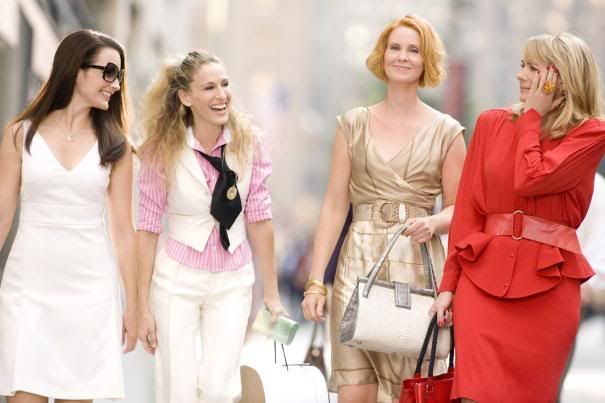 Okay, I'll fess up. I have seen every single episode of "Sex and the City." I was there for every orgasm, every bad date, every sex talk over lunch, every marriage, every not-so happy ending, and then some. I'm not afraid to admit this because as much as men, or straight men more specifically, won't admit it, "Sex and the City" has potentially forever changed men and how we communicate, interact, and in some ways, approach sex with women. A breath of fresh sex-soaked air in the late '90s on HBO, "Sex and the City" offered a glossy, gleaming world of cocktails, late night parties, and a smorgasboard of designer frocks, but more importantly it was a show that asserted the importance of love, intimacy, and self-acceptance. The greatest love we learn at the end of the series is the love you have for yourself. As trite as that might sound, that idea woke up women up from their fairy tale fog of being saved and defined by a man and gave them permission to desire the best life on their own terms. What does this have to do with men? Quite a bit, actually.
Okay, I'll fess up. I have seen every single episode of "Sex and the City." I was there for every orgasm, every bad date, every sex talk over lunch, every marriage, every not-so happy ending, and then some. I'm not afraid to admit this because as much as men, or straight men more specifically, won't admit it, "Sex and the City" has potentially forever changed men and how we communicate, interact, and in some ways, approach sex with women. A breath of fresh sex-soaked air in the late '90s on HBO, "Sex and the City" offered a glossy, gleaming world of cocktails, late night parties, and a smorgasboard of designer frocks, but more importantly it was a show that asserted the importance of love, intimacy, and self-acceptance. The greatest love we learn at the end of the series is the love you have for yourself. As trite as that might sound, that idea woke up women up from their fairy tale fog of being saved and defined by a man and gave them permission to desire the best life on their own terms. What does this have to do with men? Quite a bit, actually.
What makes "Sex and the City" such compelling and unique entertainment is the dichotomy of the real and the unreal. The women of "Sex and the City" were unashamed to pay $485 for a pair of shoes and yet we also watched them endure difficult break-ups, disappointments with the trajectory of their lives, and other harsh realities we all must face as we age and live. The artifice aspect is what seems to put off men the most, but the show brilliantly balanced that world with an emotional realism that was palpable enough to became a tonic for women to feel good about themselves that not only have they had to deal with men that weren't right them, but so has Carrie and the gang. Michael Patrick King, the director of the new film and one of the creators of the original series, was a guest on "Charlie Rose" last night and mentioned that he found as the show has gone into late night syndication that it has become a source of cozy comfort for women before they go to bed. They watch it piously and never tire of episodes they've seen time and again. It's a relationship that can't be broken. As a result they have ingratiated the ideology of the show into their own lives. Women are now allowed to no feel wrong, improper, or irrelevant for the mistakes they make. They can also be strong, sexual, assertive, and yet human, weak, and still wanting more. I can't think of too many television shows or movies that have retained such a captive audience always willing to come back to watch Carrie, Miranda, Samantha, and Charlotte assure them that life is full of triumphs and despair.
With a newly discovered sense of self via the magical world of "Sex", it has in turn made women want to emulate that same sort of quest for self-love and defined acceptance from the opposite sex. Love yourself first and the find the guy who will love you the same. If women want to wait to find themselves, then where does that leave men? A new breed of men, of course.
I caught a matinee of "Forgetting Sarah Marshall" not too long ago and it made me think of the funny era we're in cinema right now in terms of male representation. What does it mean to be a man in the 21st century and how is that reflective at the movies? Well, if you look at the flaccid, sobbing, insecure mess that is Peter Bretter (Jason Segal), we're clearly not in John Wayne territory. It's suddenly become okay for men to accept and voice their feelings. We can look pathetic, needy, sullen over a break up. Peter just wants to be loved, and isn't that something we all want? We might have never been aware of it had it not been for the the sex and love life of Carrie Bradshaw and its persuasive pull on women.
If "Sex and the City" has changed men through the stories of the women on the show, then surely the stories of the men on the show have changed our perception of maleness too, right? The three loves of Carrie Bradshaw can be broken down into the good, the bad, and the ugly. Aidan, the sensitive furniture designer, was as open and perfect as she could want from a man. However, the thought of settling down with one guy frightened her, as it does for a man to think he's chained to one woman the rest of his life, and caused her to ruin the relationship by cheating on him with Mr. Big. I once had a guy tell me he thought Berger was the most accurate representation of a man on the show. If that's true, then men are in trouble. Berger was threatened by the success of Carrie and turned inward like a child and resulted to insults and not dealing with his feelings in a grown-up fashion. He eventually dumped her on a Post It note and faded away into douchebag obscurity. The ugliest of them all is of course, Mr. Big, in all of his alpha male-emotionally-unavailable glory. Mr. Big typifies the kind of guy every guy wants to be--wealthy, powerful, attractive to any woman--but this is a an archaic definition of men. The show was always smart to not only use women as archetypes to make a point, but to abstract men as well. Aidan, Berger, and Big are in no way the summation of men, but filtered through the perspective of a woman and what she wants, their purpose is to empower women with the feeling of "don't make the same mistakes we did." The standards for attractive qualities in men and women have not been the same since.
Most of fall, the show is about friendship, which in my mind is not gender specific. Men socialize in groups similar to when Carrie and co. have lunch or go shopping. Substitute locker rooms, sports bars, and other stereotypical places you might find the average Joe talking about who crawled into his bed last night and it's the same principle. It's always perplexed me that men find this part of the show inaccessible. Men depend on their male friends just as much as the women on the show do. Male friendships minus their macho surface entail the same intimacy, honesty, and acceptance we want from the opposite sex. Admit it or not, it's true. One of the most poignant moments in the series happened when Carrie, down about a recent break-up, stumbles upon her friends at a local eatery where she immediately perks up and is warmly welcomed in. Over voice-over she eloquently states, "The most important thing in life is your family. There are days you love them, and others you don't. But, in the end, they're the people you always come home to. Sometimes it's the family you're born into and sometimes it's the one you make for yourself." I'd like to know what man can't relate to that sentiment.
"Sex and the City" has changed our culture in more ways than one, but what persists is the way it has trickled down to the real world of what we want out life and what we deserve. We're all creatures wanting to be loved and accepted and most of all, content with ourselves. That might sound like something Carrie would say and that's because she has. I challenge men to tell me this isn't a truth in their own life. Deal with it guys, this show has transformed us and them.
Friday, May 30, 2008
us and them
Posted by
w.
at
4:49 PM
![]()
![]()
Labels: bold statements, film, gender, media, television
Subscribe to:
Post Comments (Atom)



3 comments:
i need a fucktini.
The reason why so many of the show’s aspects can be easily translated for men is, in fact, because the show is written by gay males--not by women. I find it interesting that so many pontificators see this as a reflection of women, when the show is actually, as you say, a leader of women.
I really find this phenomena fascinating--would we applaud men if they acted more feminine based on a show written by women?
Good blog post by you, as always.
sorry friend, but the series was created by two gay men and six women. the majority of the writers over the series were always women. i wish i was lying...
http://www.imdb.com/title/tt0159206/fullcredits#writers
Post a Comment